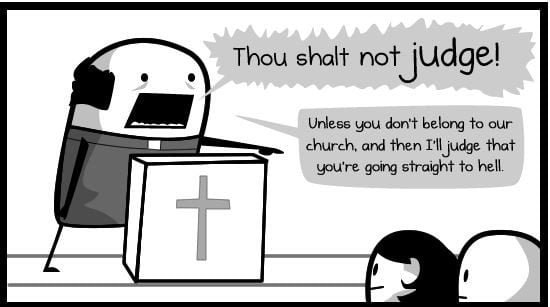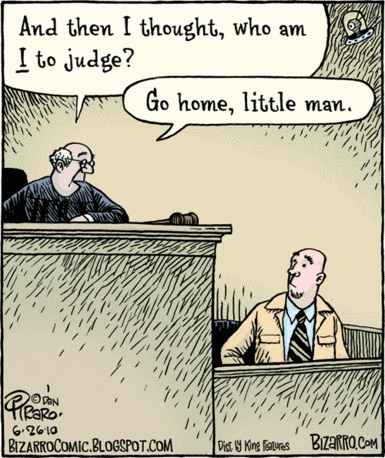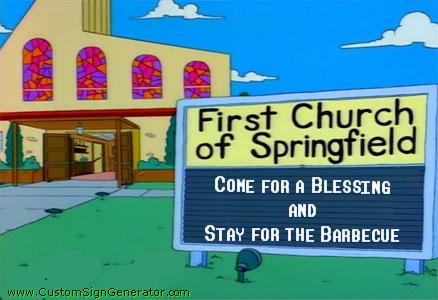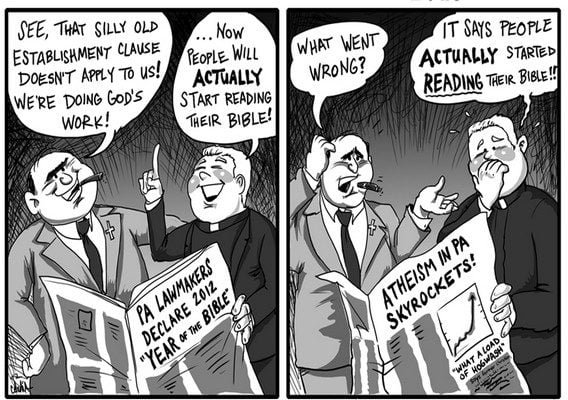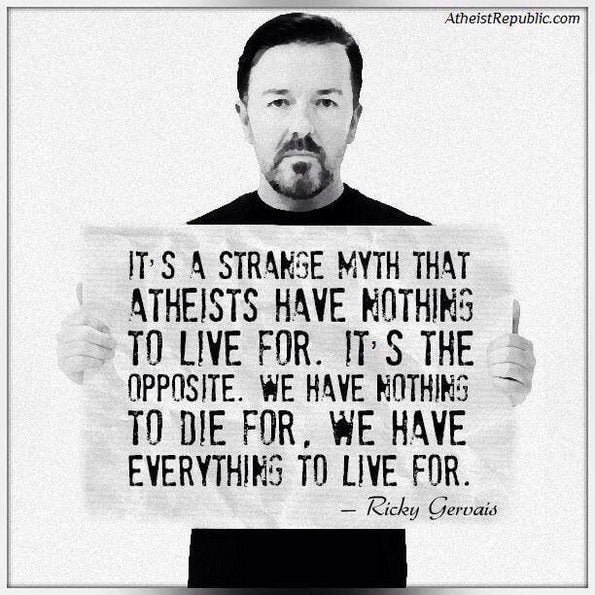
And Gideon said unto God, If thou wilt save Israel by mine hand, as thou hast said, Behold, I will put a fleece of wool in the floor; and if the dew be on the fleece only, and it be dry upon all the earth beside, then shall I know that thou wilt save Israel by mine hand, as thou hast said. And it was so: for he rose up early on the morrow, and thrust the fleece together, and wringed the dew out of the fleece, a bowl full of water. And Gideon said unto God, Let not thine anger be hot against me, and I will speak but this once: let me prove, I pray thee, but this once with the fleece; let it now be dry only upon the fleece, and upon all the ground let there be dew. And God did so that night: for it was dry upon the fleece only, and there was dew on all the ground. (Judges 6:36-40)
Let me give you a bit of context. The Israelites, those oft-sinning followers of Jehovah, disobeyed God and he punished them severely for their sins:
And the children of Israel did evil in the sight of the LORD: and the LORD delivered them into the hand of Midian seven years. And the hand of Midian prevailed against Israel: and because of the Midianites the children of Israel made them the dens which are in the mountains, and caves, and strong holds. And so it was, when Israel had sown, that the Midianites came up, and the Amalekites, and the children of the east, even they came up against them; And they encamped against them, and destroyed the increase of the earth, till thou come unto Gaza, and left no sustenance for Israel, neither sheep, nor ox, nor ass. For they came up with their cattle and their tents, and they came as grasshoppers for multitude; for both they and their camels were without number: and they entered into the land to destroy it. And Israel was greatly impoverished because of the Midianites; and the children of Israel cried unto the LORD. (Judges 6:1-6)
Jehovah impoverished the Israelites because of their sins. Modern-day followers of the Christian God must really be living right because they are definitely not impoverished.
For seven years, Jehovah pummeled his followers with the judgment stick. At the end of the seven years, the Israelites cried out to God and he sent a prophet to ask them if they had had enough of his judgment.
After the prophet left, an angel came to an Israelite named Gideon. The angel and Gideon had a conversation:
Angel: The LORD is with thee, thou mighty man of valour.
Gideon: Oh my Lord, if the LORD be with us, why then is all this befallen us? and where be all his miracles which our fathers told us of, saying, Did not the LORD bring us up from Egypt? but now the LORD hath forsaken us, and delivered us into the hands of the Midianites.
Angel (or Lord): Go in this thy might, and thou shalt save Israel from the hand of the Midianites: have not I sent thee?
Gideon: Oh my Lord, wherewith shall I save Israel? behold, my family is poor in Manasseh, and I am the least in my father’s house.
Angel (or Lord): And the LORD said unto him, Surely I will be with thee, and thou shalt smite the Midianites as one man.
Gideon: If now I have found grace in thy sight, then shew me a sign that thou talkest with me.
God gave Gideon the sign he requested and he went forth to be a messenger for God, for a while.
It seems that Gideon’s skeptical side kept getting in the way. He wanted to make sure it really was Jehovah speaking to him, so Gideon asked God to prove to him he really was God.
Gideon put a fleece of wool on the floor. He said if the fleece was wet in the morning and it had not rained (or dew covered the ground) outside he would believe what God had said.
Sure enough, the fleece was wet in the morning. Did Gideon believe God? Nope. Skeptical Gideon asked for more evidence.
Gideon reversed the fleece experiment. He said if the fleece was dry in the morning and there was dew on the ground outside, he would believe what God had said.
Sure enough, the fleece was dry in the morning.
God allowed Gideon to test him multiple times (read Judges 7 to see more of Gideon’s God tests). Evidently, Gideon had a faith that required authentication and proof.
In the Independent Fundamentalist Baptist (IFB) church movement I grew up in, putting out a fleece was common practice. Putting out a fleece was a way of “testing” God or finding out the “will of God.”
Like casting lots and drawing straws, Christians use putting out a fleece as a way to make decisions. In 1979, I was looking for a job, so I applied for a restaurant management job with a company in Findlay, Ohio. They told me they had an interest in me working for them and they would get back with me with their final decision. At the time, we were living in Montpelier, Ohio. We were thinking about moving to Newark, Ohio, the central Ohio community where Polly’s parents lived. What should we do? Restaurant manager in Findlay or move to Newark?
So, I put out a fleece. I prayed, “God if you want me to take the restaurant manager job then have the company call me by ____________. If they don’t call, I will take that as a NO from you.”
The call didn’t come, so we packed everything up and moved to Newark. The funny thing? The restaurant company called a day or two AFTER the fleece deadline and offered me a well-paying job. I stood by what I had divined through putting out the fleece.
Silly, I know.
Christians often use this kind of thinking without even recognizing it. Such and such will happen in their life and they take that as “proof” that God is moving and working in their lives. I have heard countless prayers where a person said “I was praying for _________________ and sure enough God came through. What an awesome God we serve!”
Never mind that there are multiple explanations for _________________ happening. Even when unexplainable things happen, why is it assumed that it is God making things happen? Unexplained things are just that — unexplained.
Sadly, many Christians wait for God to work, move, come through, or bless them. As a result, they are robbed of the ability to make decisions on their own. Unless they can “sense” God working, they refuse to make a decision. Or they make a horrible decision because they have a feeling they call “God.”
For the non-Christian, reason, common sense, experience, and advice from others, is usually sufficient for making a decision. Sometimes, when it is necessary to make a quick decision, we have to “go with our gut.” Going with our gut, however, is not the same as going with God (article on Psychology Today about this subject).
How about you? Do you have any “putting out a fleece” stories to share?
Bruce Gerencser, 68, lives in rural Northwest Ohio with his wife of 47 years. He and his wife have six grown children and sixteen grandchildren. Bruce pastored Evangelical churches for twenty-five years in Ohio, Texas, and Michigan. Bruce left the ministry in 2005, and in 2008 he left Christianity. Bruce is now a humanist and an atheist.
Your comments are welcome and appreciated. All first-time comments are moderated. Please read the commenting rules before commenting.
You can email Bruce via the Contact Form.

